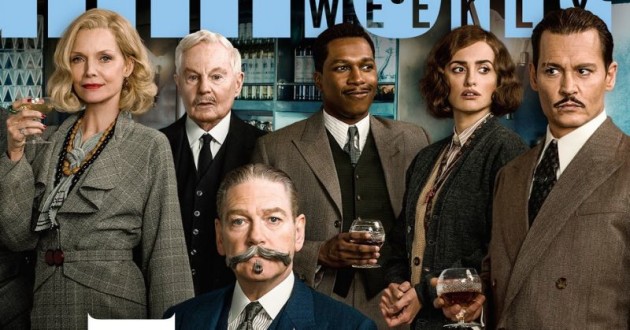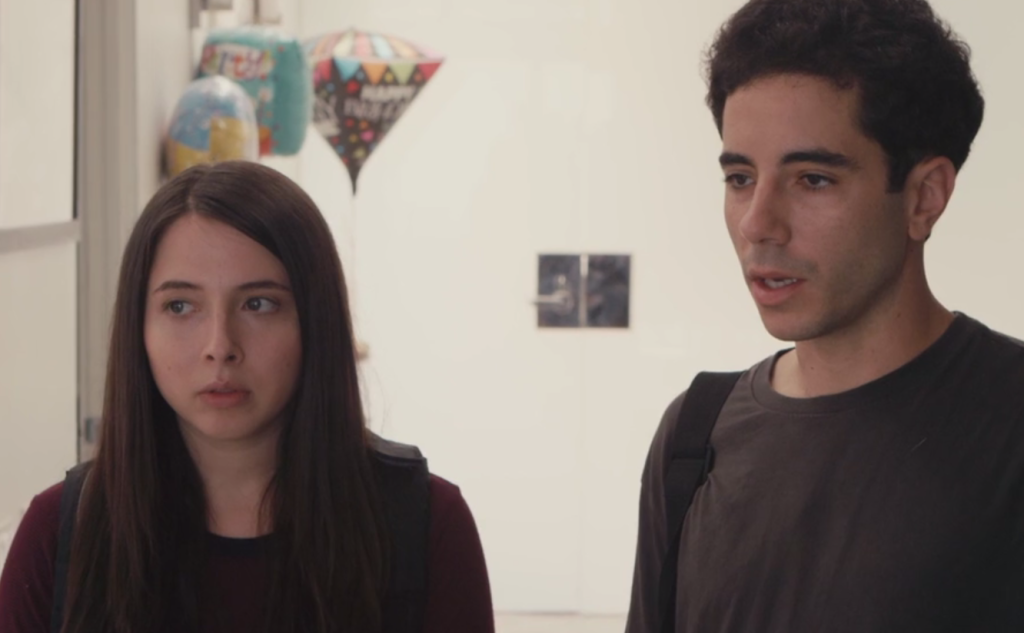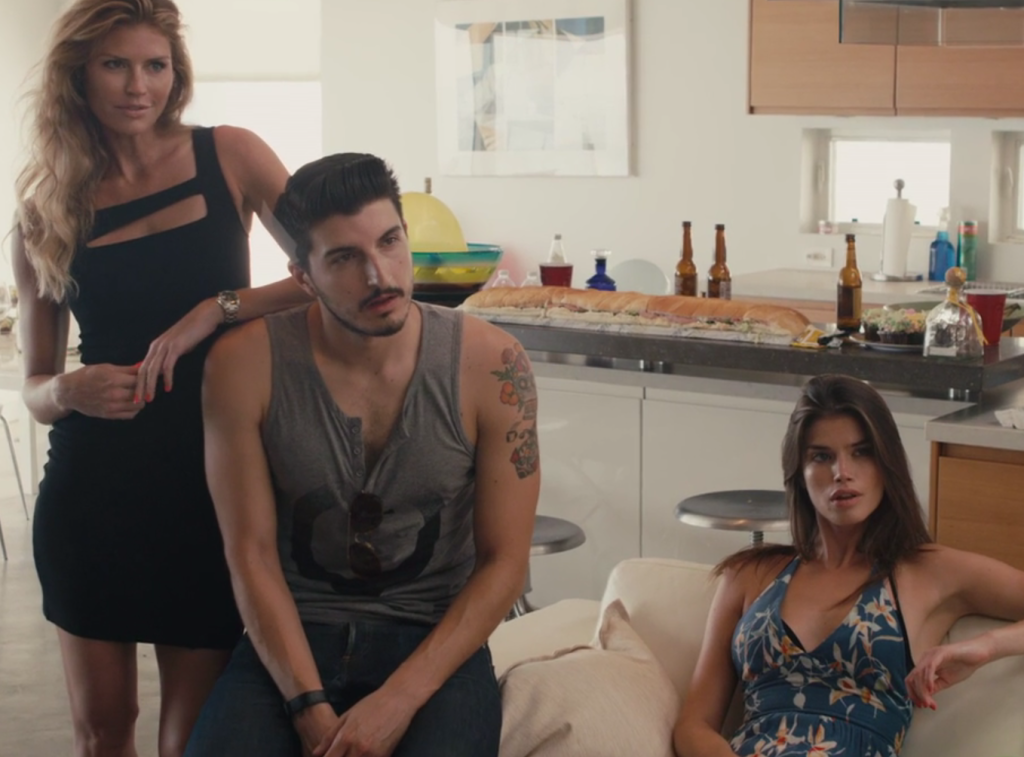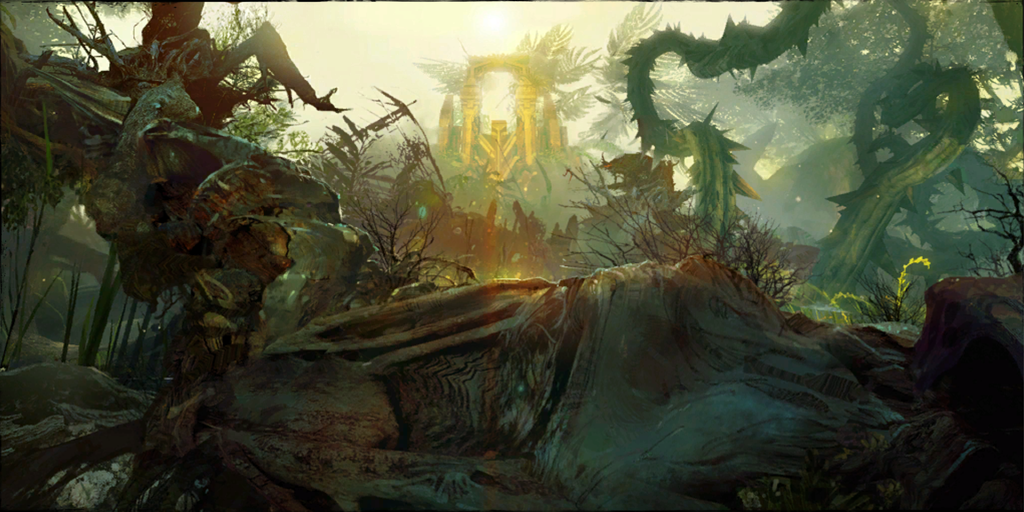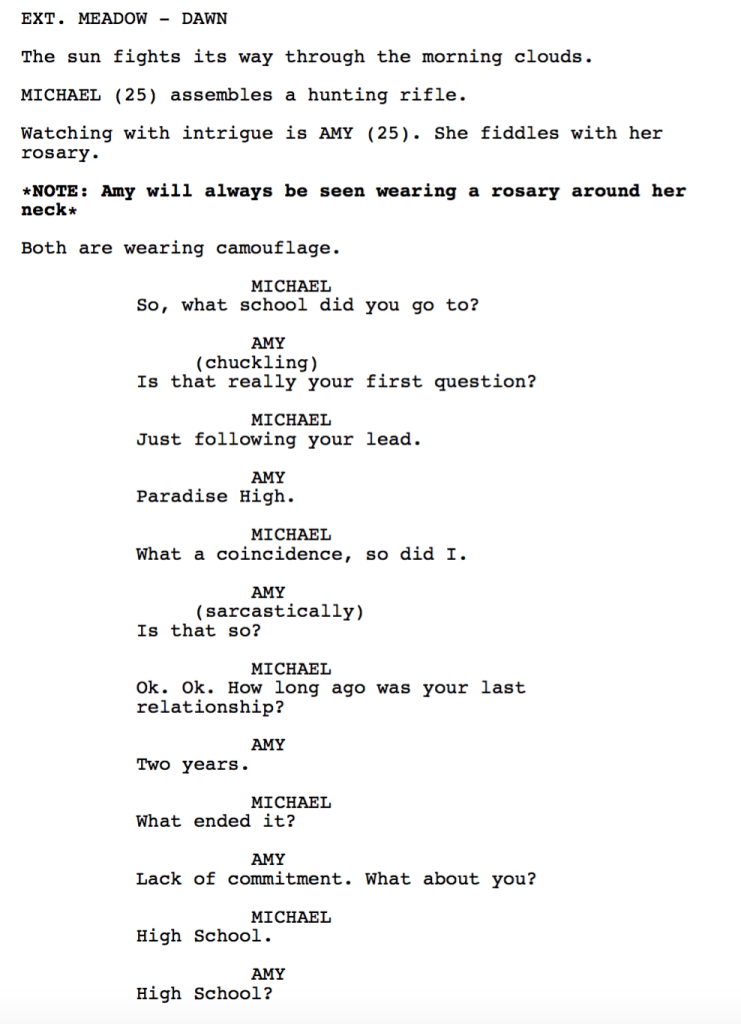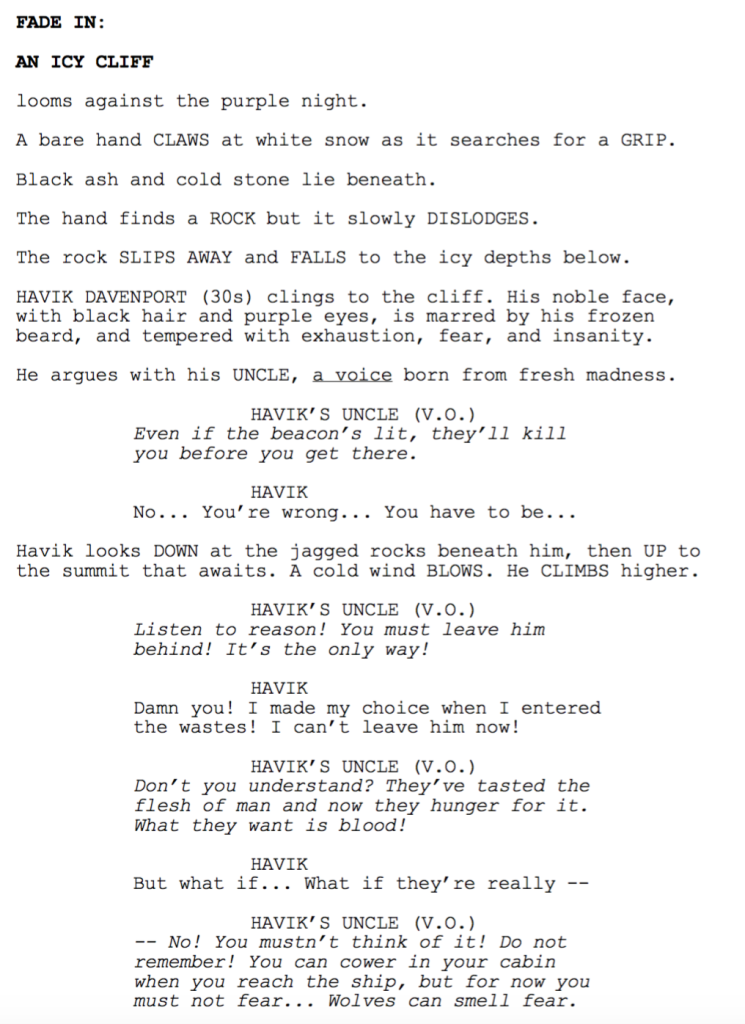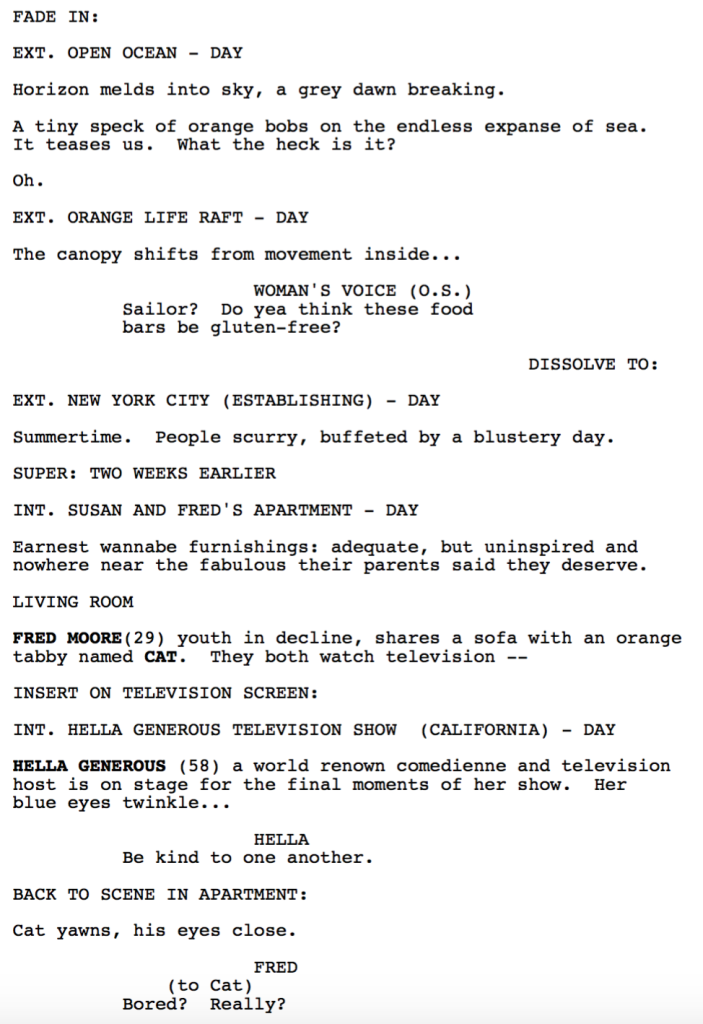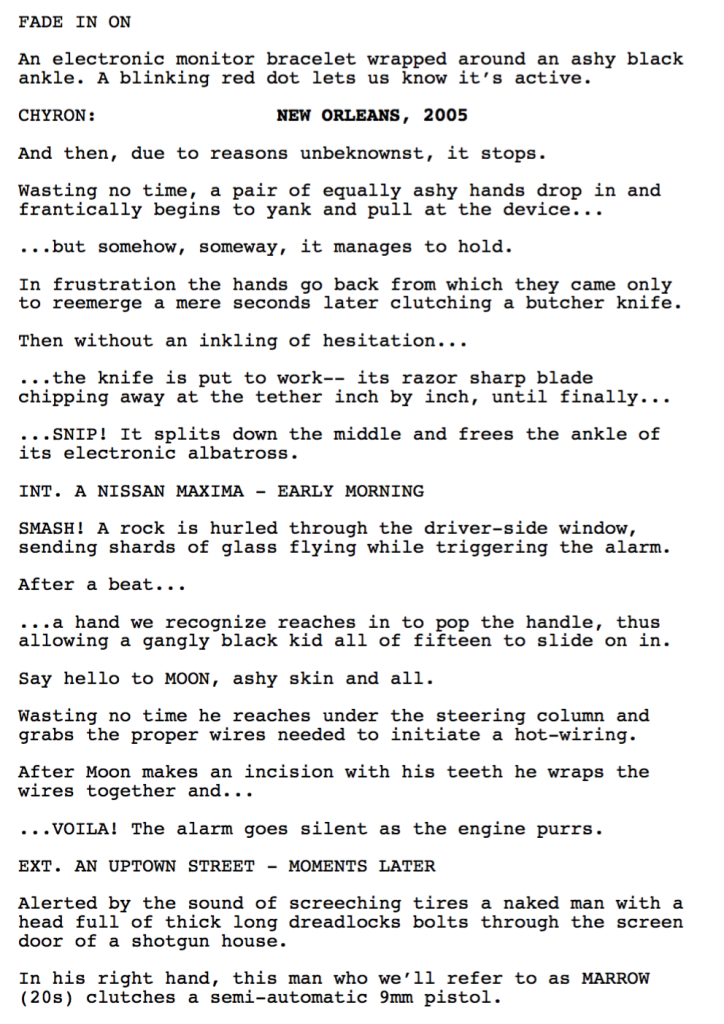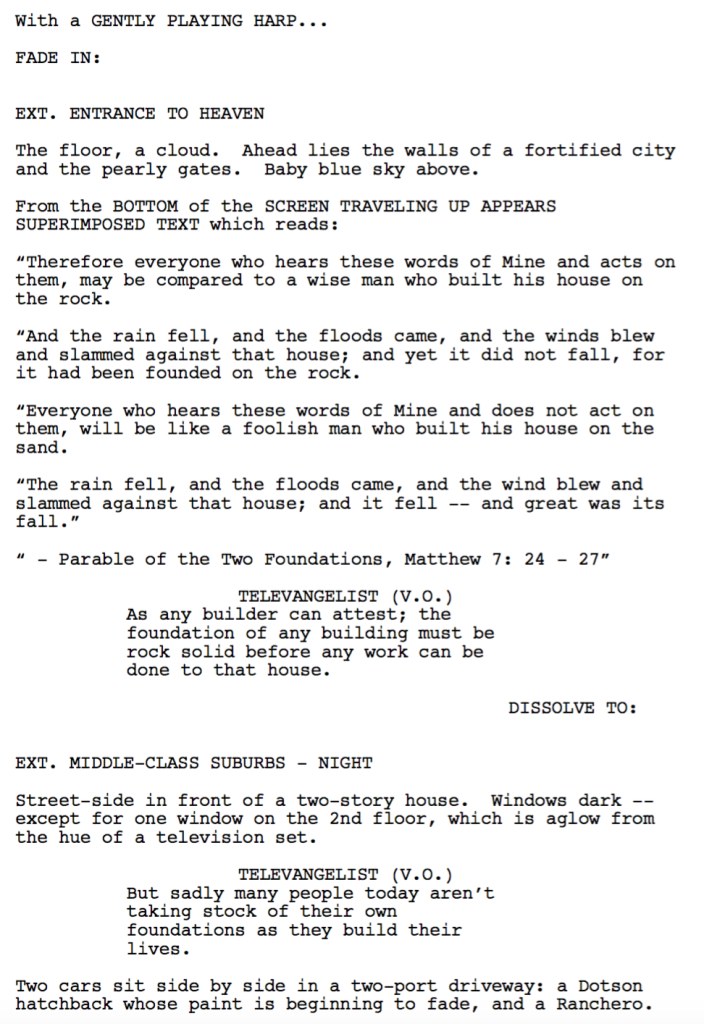Genre: Mystery
Premise: (from IMDB) A lavish train ride unfolds into a stylish & suspenseful mystery. From the novel by Agatha Christie, Murder on the Orient Express tells of thirteen stranded strangers & one man’s race to solve the puzzle before the murderer strikes again.
About: Today’s screenplay was written by a writer The Hollywood Reporter just called, “The most famous screenwriter you’ve never heard of.” Never has a statement been more true. Michael Green is on some kind of streak. Once known only for his involvement on the failed Green Lantern movie, Green has been unstoppable this year, scripting Logan, Alien: Covenant, American Gods, Blade Runner 2049, and now this. Murder on the Orient Express will star Johnny Depp, Daisy Ridley, and Josh Gad. It was directed by Kenneth Branaugh and comes out this November.
Writer: Michael Green (based on the novel by Agatha Christie)
Details: 133 pages (2/20/15 draft)
Murder on the Orient Express is an odd project that probably would’ve remained in obscurity had it not been for Josh Gad’s viral videos asking Daisly Ridley questions about Star Wars Episode 8. In all my years, I’ve never seen a movie find buzz quite like that before. Then there was that now infamous trailer that ended with a severely mismatched piece of music by the Imagine Dragons.
This may seem like nothing to the casual movie-goer. But knowing how hard it is to create buzz for a film if you’re not part of a Marvel or Star Wars universe, the fact that this obscure title can drum up any buzz at all is impressive. I mean, you’d be hard-pressed to find anyone last year saying, “You know what they need to remake? Murder on the Orient Express!”
I personally consider this setup to be ingenious. A group of people not just stuck in a room, but stuck on a train in the middle of nowhere? A murder that must be figured out before they get to the next stop? It’s a tailor-made plot for a film. Let’s see how it turned out…
It’s the 1930s and Hercule Poirot is the most successful investigator in the world. And he’s not afraid to tell you that. But Poirot has been solving too many burglaries, too many murders. The dude just wants a vacation. So he hops on the Orient Express to travel to some faraway land and get some R&R.
Because Poirot is so famous, he’s able to get a first class cabin, and he’s joined there by a number of characters. There’s Bouc, an aging partier who works for the Orient Express. There’s Ratchett, a blustery American who buys and sell antiques.
There’s Caroline Hubbard, a 40-something 2-time divorcee who’s on the prowl for her third husband. There’s Mary Debenham, a young beauty who’s carrying on a secret romance with a black doctor, Arbuthnot. The two are traveling “separately.” There’s a Russian Princess, a Hungarian Count, a formally violent Cuban, and a slew of other characters, all on their way to different destinations.
On the first night, Ratchett arrives in Poirot’s cabin and tells him that the mob is after him and he wants to hire Poirot for protection. Poirot blows him off. Ratchett storms away. And the next morning the train comes to a sudden stop. Everyone’s informed that the train has hit some snow and that they will be stuck there for awhile.
Moments later, Ratchett is found dead in his cabin, stabbed 12 times. Bouc freaks out and says if they don’t figure out who killed him by the time they reach the next stop, the Slavs will use their own sense of justice, randomly pick a killer, and hang him right there in town. To avoid this fate, Poirot will have to come out of vacation and solve his toughest case yet. What he will find during this investigation… will shock everyone.
A couple of years ago I introduced a term on the site: burden of investment. I use this to describe the amount of work the reader must do to keep up with a script’s setup. When the writer inundates the reader with insane amounts of information in the first act, it causes a “reader short circuit,” effectively K.O.ing their mental facilities, throwing them into skim-mode for the rest of the story.
Murder on The Orient Express has a high burden of investment. There are a TON of characters to remember. And each character’s name is unfamiliar, making it even tougher to remember who’s who. All of them are going to unique destinations and have unique backstories and objectives. By the time you get to page 30 of this script, your brain is so scrambled, all you can think about is taking a nap.
Even if you get through this section, the script doesn’t get much better. Part of the problem with “Orient” is that the story is so old fashioned. Which I guess is the point. But you have to find a way to modernize SOME aspects of the story. Or else everything just feels… old.
The writing is stodgy and formal. The dialogue is as well. Here’s an early line from Poirot: “I am of an age and level of experience where I know what I like and what I do not. What I like pleases me enormously. What I do not I cannot abide. For example, the forced pleasantry before what is determined to be a business discussion.”
The whole script reads like this.
But it’s not just the writing. It’s the plotting. It’s very “And now I’ll go question this person, and now I’ll go question this person, and now I’ll go question this person.” It’s repetitive to a fault. Any format that repeats becomes predictable. And predictability is the predecessor to boredom. You need to shake things up. Outside of a fun chase sequence through the snow, “Orient” rarely shakes things up.
There were other dated choices as well. For example, the murdered character was an asshole. These days, when someone gets murdered in a movie, they’re almost universally a good person. Or else why would we care that their murder be avenged? I think back in the 30s, the mystery alone was enough for readers to be engaged. Today, we need to feel some connection to the victim to care.
Likewise, the construction of Poirot’s character is at odds with today’s heroes. The guy is the best in the business. He has no weaknesses. We know, from the get-go, that he’s going to solve the case. I think these days, the hero would be more flawed, more tortured, and probably not as good at his job. All of this would inject doubt into whether he would solve the case or not.
Doubt is drama’s best friend.
However, even if you were to ignore that modernist take, they still had something to work with. Poirot’s ego. Had they explored that as his flaw – his ego being his downfall – that could’ve been interesting. And yet, they decided to play the character straight up. He’s got an ego but who the cares? Not relevant to the story!
The one thing I liked about the script was that the murder on the train was tied to the murder of an innocent family that was set up as backstory at the beginning of the script. I never like something that’s straightforward (a man is dead, find his killer). By including that other murder, it added an extra layer to this murder, almost creating a secondary mystery. That was cool.
Unfortunately, the stodgy storytelling, the pragmatic pacing, and the flaw-less hero made for a less-than-stellar reading experience. All I wanted out of this movie was to have fun. This is a FUN premise. Instead, the whole thing felt like work.
[ ] What the hell did I just read?
[x] wasn’t for me
[ ] worth the read
[ ] impressive
[ ] genius
What I learned: Broad Stroke Writing vs. Specific Stroke Writing. When you come into a scene, you can give us the broad strokes (Joe stands by the window, staring out. Jane makes coffee). Or you can give us the specific strokes (Follow a deep long crack up a frost-bitten window, the sound of heavy breathing nearby. Moving back, a man stares out into the cold day). The former is if you want to jump right into plot. The latter is if you want to create a mood or set a tone for the scene. You will usually use broad strokes in screenwriting. But when you want us to feel a scene, move to specific. Here’s an early example of specific strokes in Orient Express…
Genre: TV pilot – Half-Hour Single-Camera Comedy
Premise: Follows the adventures of two Los Angeles 6’s trying to make it in a land of 9s and 10s.
About: Today’s TV pilot was picked up by the newly branded “Freeform” Channel, which has gone all in on the millennial demographic. Creators Benji Aflalo and Esther Povitsky shot a pilot episode on their own, which got the attention of Andy Samberg’s Lonely Island crew, who came on as producers.
Writers: Benji Aflalo & Esther Povitsky & Eben Russell
Details: 35 pages
The conundrum with television pilots is that television is long-form storytelling. And long-form storytelling works best with lower-concept material. Shows like Friends, Law & Order, Modern Family… there’s no big concept to any of these shows. It’s just characters and a barely-there initial hook (“They’re friends in New York!”).
While this used to be enough, a new problem has arisen: insane competition. If you come to the plate with a low-concept TV idea these days, there’s a good chance your show will get buried. This has resulted in what I call the “high-concept low-concept” TV idea. It’s characters getting into situations, just like the shows I listed above, but inside bigger and more specific worlds. Veep – the White House. Silicon Valley – tech startups. But even that’s not enough anymore. So TV is going the way of features – scrambling for big IP (Rosemary’s Baby! Training Day! Comic Book shows!).
How, then, did Alone Together rise above all this? I’ll answer that in a second. But first, let’s check out what Alone Together is about.
Benji and Esther are the 20-something runts of LA. Don’t worry. That’s not a harsh analysis. They’d agree with it. And therein lies their struggle. They’re two bottom-rung barely attractive actors trying to stand out in a town full of the most beautiful people in the world.
Whereas Esther is a Midwest transplant who can barely afford her rent, Benji’s parents have “Fuck you” money, the problem being that the main person they say ‘fuck you’ to is Benji whenever he asks for any of it. This leaves Benji living in perpetual irony – he’s got a room in a beautiful house in Malibu, but can’t afford gas to get there.
When Benji’s brother and sister hold a huge party at the house, it’s an opportunity for Esther to expand her social circle and finally get that boyfriend she’s been angling for. While she fails miserably at that plan, Benji catches the eye of a hot party-goer when she learns he lives here.
When Esther suspects that Benji’s new girlfriend is an escort, she’s forced to sign up as an escort herself on the service to confirm her suspicion. Soon, men are hitting her up for dates, and while she’s initially grossed out, she starts to like the idea of getting wined and dined, and agrees to a date with an older gentleman. Naturally, both of our heroes’ situations implode, leaving them back at square one, a square they’re starting to believe they’ll never escape.
Like I said earlier, these super-low concept shows are a dime a dozen on the script circuit. And because there’s no concept, everything boils down to how inventive the comedic situations are and how witty the dialogue is. And it’s not like it’s impossible to stand out in these areas. But when that’s all your show has to offer, you’re handicapping the shit out of yourself.
With that said, there’s some pretty funny stuff in Alone Together. In this exchange, Benji attacks Esther for going out with an old dude from the escort site…
BENJI: I hope you figure that out when that guy kidnaps you and locks you in a basement forever.
ESTHER: Whatever. Free rent.
BENJI: You could literally get your head cut off!
ESTHER: Warren’s not cutting anyone’s head off! Not with his rheumatoid arthritis.
Or when Benji’s asshole older brother points out to his two model girlfriends that Benji and Esther are a lot older than they look…
MODEL GIRLFRIEND 1: You’re like twelve. Why are you worried about aging?
DEAN: Actually, they’re both pushing thirty.
BENJI: I look young because I spend most of my time alone and don’t have to make a lot of facial expressions.
Even the character descriptions are funny. Here’s Benji’s: “BENJI, pathetic but confident.” I love character descriptions that are to the point. Too many writers try and stuff a biography into their character intros. Keep it simple.
With that said, this is still a basic comedy about two people living in a city trying to make it. It’s universal but devoid of a sexy hook. How, then, was it able to leap frog all the clones? One. Simple. Answer.
THEY WENT OUT AND F*&KING SHOT IT THEMSELVES.
Shooting anything is hard. So when you have a tangible product to show people? That’s a thousand times more valuable than a script. When a producer sees that, they know what they’re getting if they give you money to make a show. That same producer might have three other funnier scripts on his desk. But those are just pieces of paper. What may come of them is a mystery. This is tangible proof that you know how to make a show.
And I’m not saying this is the only way to get your pilot noticed. What I’m saying is, we all start with the same number of chips. But you can do things to raise your pile. You can come up with a high concept. That famously happened with True Detective.
You could shoot something professional, like these guys did. Or shoot something barely professional that still shows how funny your talent is, which is what the Broad City gals did, posting shoddily-produced vignettes on Youtube.
If you don’t have access to production equipment, think of something else. Come up with a teaser, get somebody to draw concept art. Remember, this is the ENTERTAINMENT BUSINESS. They want a show. Give it to them. That’s part of your job.
Now, what’s interesting about these guys shooting their own pilot and the changes they’ve made to the script is that the produced pilot is better. Not by a lot. They’re both funny. But you could tell that once they had more money, they were trying to build a bigger story. We had the big party scene and a date restaurant scene.
In the produced pilot, all the locations were rooms or easy-to-shoot exteriors. There were never more than 4 characters in a scene. It forced the writers to be more creative. For example, instead of a big party at the Malibu house, Benji and Esther show up after the party is over and bring their out-of-their-league crushes to the place hoping to get laid, and the crushes end up with each other instead.
It’s a classic example of how bigger doesn’t always equal better.
Still, I liked both versions of the show. These two actors are funny. And the big lesson here is if you want something – such as having a show on television – you gotta fight for it. Nobody gives out participation trophies in Hollywood. Do everything in your power to show that you’re serious.
[ ] What the hell did I just read?
[ ] wasn’t for me
[x] worth the read
[ ] impressive
[ ] genius
What I learned: Comedy’s all about placing your characters in situations then asking, “What’s the worst thing I can do to them right now?” In the produced pilot, Benji and Esther just spent all their money on one of those ridiculously expensive LA juice cleanses so they can look like rail-thin movie stars. They’re going to hole up in Benji’s house for the weekend and only drink juice. So… what’s the worst thing you can do to your characters in this situation? They get there at the tail end of their brother’s party and there’s copious amounts of food everywhere. Fried chicken. Cupcakes. Pies. Waffles. Donuts. The one temptation that can ruin their juice cleanse is staring them right in the face.
Genre: Action/Adventure
Premise: The military contracts a disgraced Harvard professor who believes in dragons to escort them to a mysterious island where the mythical beasts potentially still exist.
About: What else is there to say? It’s another Max Landis script, baby. The one writer still making huge spec sales. This one, to my knowledge, has not sold yet. But if anyone has any updated information on that, let me know.
Writer: Max Landis
Details: 120 pages (Dec 2014 draft) Second Rewrite
Max Landis really likes orcs.
And dragons.
And fairies n stuff.
By the way, I finally figured out why the trailer for Landis’s Netflix flick, “Bright,” begins with that uncomfortable fairy-beating sequence. I realized that a meeting took place within the Netflix brain trust…
“How do we show that this is the kind of fantasy movie Hollywood can’t make?” So they had Will Smith beat the shit out of fairy, the message being: This ain’t your grandfather’s fantasy flick.
Was that choice a success? No.
But that’s what’s great about Netflix. They’re okay with taking chances. And chances often fail, as I’ve discussed in a recent Scriptshadow post.
So let’s get to today’s script, because I think there’s a huge screenwriting lesson we can learn from it. But before I tell you what that is, let’s dive bomb, dragon-style, into the plot…
Terra Obscura starts with one of the most traditional first acts you’ll find in a movie like this. Which was surprising since Landis is such an anarchist. Adam Burns just got fired from his Harvard professorial job after an interview of him saying he believes in dragons goes viral.
After his girlfriend reams him out for deep-sixing his career, Adam is kidnapped off the street by men who’ve watched too many movies, since they throw a bag over his head then yank him into a van. They then throw him on a helicopter, informing him that they’re going to an island where a Russian sub thats’s been programmed to launch a nuclear attack on the U.S. has crashed.
Adam makes it clear he doesn’t know why he’s here. “I don’t know what’s going on.”
“On the contrary,” the military official tells him. “You might be the only one who knows what’s going on.”
Cue our “HARD CUT TO” Predator helicopter moment. Oh yeah, this island they’re going to may contain… creatures of the magical type. That’s confirmed the second they fly over land when two dragons that would make Khallesi’s corset explode attack the Blackhawks.
Adam’s helicopter crashes and he and the men use a radiation meter to figure out where the marooned sub is. But on the way there, they run into orcs and fairies and Necromances and Dark Elves and other nerdy monsters. What Adam realizes is that the Russian sub may have been a ruse. Which means they’ve been lured here. But why? The answer may be much worse than a measly nuclear attack on the United States…
The first thing I noticed about Terra Obscura had nothing to do with Terra Obscura. Rather, it had to do with Skull Island and Ghostbusters. Strangely, two of the first three scenes in Landis’s script have helicopters arriving on an “invisible” island and giant monsters attacking them. After that, we flash back to show Adam getting fired from his job at a prestigious university because he yelled into a camera, “I believe in dragons,” then got fired by his boss after it went viral.
Both these scenes, almost verbatim, were in Skull Island and [the new] Ghostbusters. I see that this script pre-dates both of those films. So what does that mean? I remember Landis either worked on or was going to work on Ghostbusters. So maybe he wrote a similar scene there and they used it cause they had the rights? But I didn’t know Landis worked on Skull Island. And if he didn’t, does that mean someone just took this scene from Terra Obscura?
Of course, there’s a third possibility: None of us are as original as we think we are. Maybe these ideas are so obvious that everybody is writing versions of them. I don’t know. But I found that surprising. I was like, “I’ve seen both of these scenes already!”
There’s a bigger talking point I wanted to get into today, however. And it has to do with the fact that Bright got made and Terra Obscura (as of today) did not. Why is that?
BUDGET
Bright is set in the real world with actors wearing prosthetics. Terra Obscura is shooting in a jungle with a full slate of Lord of the Rings like creatures. In other words, it’s a lot more expensive.
I’m often asked by writers if they should write something big budget or small. The answer to this is more complicated than you’d think but I’ll give you the simple answer first. SMALL. Look at the data. How many non-IP giant-budgeted movies are made a year? Two? How many non-IP small budget movies are made a year? A LOT. So you’re increasing your number of buyers exponentially with a lower-budgeted script. Which is why Bright was kind of genius. It was a high-concept idea that was financially achievable.
However, there’s a growing belief that it’s so difficult to sell screenplays, you have to entertain the long game when thinking about which script to write. So if you want to write big-budget movies like James Bond, you write a James Bond-like movie, knowing that it isn’t going to sell. However, if people like it and you get buzz from it, you’re now brought into the Hollywood loop, and you’re in contention for assignment work on movies like that. So in that case, writing the big-budget idea was the way to go.
The point is, it depends on what your goal is. If you’re just trying to sell, Bright is the perfect conceptual blueprint. It’s a budget-friendly genre idea. But if you want to write for the Star Wars or Avatar franchises, write the best sci-fi fantasy script of the decade. Just know that you ain’t going to sell it.
As for the Terra Obscura script (which is the name of the island, if you were wondering), it was pretty good. It poses an interesting question for a script like this. Do you make your hero resistant or active? In the similarly set up, Aliens, Ripley is a boss. She’s all in right away. In Terra Obscura, Adam doesn’t want to be here at all. He’s scared. This is too much for him.
Both options have their pros and cons. When your hero is resistant, like Adam, he has somewhere to go as a character. It’s clear that there’s going to be an inner journey here. Him being able to overcome his fear will lead to him changing, which, when done well, results in a more impactful viewing experience.
However, in Aliens, Ripley is thought of as one of the best characters ever. And she was active and brave from the start. Why did that work? Well, Cameron decided to explore a different part of Ripley to show her growth. Both her distrust of the mission and her role as a mother to Newt became the backbone for her character growth.
And that’s the thing screenwriters forget. You’re not limited to one of those “fatal flaw” boxes. You can play outside the box.
Also, I find it dangerous to have a hero who’s too weak. Even if they’re eventually going to arc into a strong person, we’re going to be spending at least half the screenplay with them as a weakling. And audiences have trouble rooting for weaklings (not physical weaklings, but mental). That hurt my overall opinion of the script.
However, Landis knows how to keep a script entertaining. And whereas the Kong Skull Island plot points were visible from light years away, I didn’t know where this script was going. The Dungeons & Dragons creatures angle threw me off. And Landis’s love for that world resulted in numerous twists and turns I wasn’t expecting.
So Terra Obscura was just fun enough for me to recommend.
[ ] What the hell did I just read?
[ ] wasn’t for me
[x] worth the read
[ ] impressive
[ ] genius
What I learned: A trick for writing high-concept low-budget genre films is to utilize one fantastical element and place that element inside the modern-day world. What this does is it ensures that studios don’t need to create any expensive effects-driven worlds. They can shoot 95% of the movie in real world settings. Then, the one fantastical element (Orcs in Bright, or time travel in Primer) is what gives your script a big feel for a cheap price.
Congratulations to Michael Harper and his script “Hellpig,” which received a “WORTH THE READ” yesterday, no small feat for an amateur script. We’ve been getting lots of good scripts lately. And that’s all you guys. The writers writing these scripts and the diligent Scriptshadow readers who are reading and voting for them. This doesn’t happen anywhere else on the internet so it’s a cool process to see. You all deserve a giant thank you.
Okay, enough ass-kissing. It’s time for a new batch of scripts. Here’s how to play: Read as many of this weekend’s scripts as you can and VOTE for your favorite in the comments section. Winner gets a review next Friday.
If you’d like to submit your own script to compete on Amateur Offerings, send a PDF of your script to carsonreeves3@gmail.com with the title, genre, logline, and why you think your script should get a shot. Good luck!
Title: Invasion
Genre: Sci-Fi, Drama
Logline: Presumed dead, a man returns home claiming to have been abducted by aliens, and warns that they are planning a large scale attack. Deemed insane, he decides to start a survivalist camp dedicated to fighting the impending invasion.
Why You Should Read: I’ve always wanted to write a movie about aliens, but I wanted to find a unique way to make it stand out from all the rest. I believe I’ve achieved that. A reader compared “Invasion” to the critically acclaimed “Stranger Things”, being that both manage to operate as a higher scale sci-fi piece and a family drama. At its heart, this is a love story about the lengths we will go to protect those we love, no matter how insurmountable those odds may be.
Title: Dead Star
Genre: Horror
Logline: When a Polar expedition awakens a sleeping god and unleashes doom upon the world, its only survivor is stalked by wolves across a snowy wasteland as he struggles to make it back to his ship alive.
Why You Should Read: Dead Star is GAME OF THRONES meets THE THING. In the spirit of a confined horror, the rich mythology of a foreign world unfurls as you accompany an anti-hero who believes only in science and what he can see with his own eyes. And as the paradigm of his world collapses, and he finds himself slowly but surely believing in the impossible, we experience right along with him his fearful descent into madness as he tries to outwit a god-like villain unlike any you’ve ever seen before.
Title: Let’s Be Famous
Genre: Adventure comedy
Logline: After two fame-seeking Millennials are outed for their plans to fake a sailing adventure blog, no one believes it when they really are ship-wrecked and lost at sea.
Why You Should Read: The first half of the story pokes fun at our obsession with fame and lampoons our dependence on smart phones. In the back half I play with what might happen when you take away the phones. Do we remain tethered to societal whims and expectations? Or do we gain clarity about who we are and what we really want?
I took some chances with the back half. Yes, indeedy. Curious if it works.
Thanks ahead of time to all who check it out!
Title: Quiet Storm
Genre: Crime Drama, Coming of Age
Logline: After discovering a stash of drugs during a carjacking a deaf teen delinquent finds himself pursued by crooked cops as Hurricane Katrina approaches.
Why You Should Read: I’ve received some high marks recently on this– including an overall eight (as well as six sevens) from the Blacklist– and earlier drafts have placed in various contest including all the biggies: Nicholl, Scriptpipline, American Zoetrope, Page, etc. So now I’m hoping to use this as a writing sample to land a rep.
Title: A Heart Built on the Sand
Genre: Urban Drama
Logline: The ideal life being striven for by a sexually charged woman in her 40s gets put to the test by the men that she loves and the demands of her job.
Why Carson should review this script? He owes me this. Back when he had a guantlet challenge I sent this script to him to challenge Allan Ball’s “American Beauty” (1999: directed by Sam Mendes) — and my challenge got discarded by him. But now I just wanna get this script in the hands of Niccole Kidman so I can be the scribe who helps her win an Oscar for best actress. Original idea for this script was a woman undone while the song “Tall Cool One” by Robert Plant plays.
One last thing. If you didn’t open a script because of what you read on one of the first pages above, take a moment and tell the writer why you chose not to open their script. Be truthful but polite about it. Remember, most writers go through life having no idea what people really think about their stuff. So they don’t know what to fix. Help these writers become better! :)
Genre: Horror/Comedy
Premise: When pipeline construction encroaches on its pristine Dakota Badlands territory, a giant prehistoric pig creature unleashes hell on a group of unsuspecting humans, who must band together in order to survive.
Why You Should Read: Longtime SS lurker here, ready to throw my script into the pit. Hellpig is a heapin’ helpin’ of action, gore and camp with a Sharknado tone, a unique monster and buckets of blood. Thanks to Carson and everyone for the opportunity and the reads.
Writer: Michael Harper
Details: 96 pages
It’s awfully funny.
Just yesterday I was watching Maximum Overdrive, the Stephen King directed film that was featured in the script I reviewed Wednesday. That film exists in the same universe as Hellpig. And despite being written by someone who doesn’t yet have a produced credit, much less 40 best selling novels, I gladly contend that Hellpig is better than that film.
How much better? After Scriptshadow’s own, Steph Jones, came up with the script’s tagline (“Go pig or go home!”), I’d say it beat the King debacle by a full lap.
But let’s be honest. Maximum Overdrive is hardly a cinema classic. Which means Hellpig hasn’t yet secured a passing grade. Let’s lift the cover off this pig in a blanket and see if it passes the ultimate test – the ‘squeal like a pig’ test.
45 year-old Walt Harvey is the most hated man on the planet. He’s one of those big game hunters who kills animals then takes douchey pictures with them before blasting the pictures all over social media. His latest conquest was a hippopotamus, which he and his camo-covered wife took down.
When rumor hits the street that the hippo was old and possibly fenced-in, however, Walt looks like a ten-ton asshole. The only way to redeem himself, in his mind, is to kill a 16-point elk, which he’s looking for in the heart of South Dakota.
Nearby, Harlan Hawes runs a Christian Rehabilitation Youth Academy that’s got four new members. There’s 17 year-old Max, who’s got a gambling problem, 17 year-old Kaci, who’s been suckin face with multiple men. There’s Doyle Choi, a 16 year old Korean pyromaniac. And 18 year-old Jed, a rich kid who steals anything he can get his hands on.
Harlan’s plan is to escort (force) them into the forest and rid their bodies of Satan. Little do any of these people know that a giant Hellpig is in the vicinity, burping out a new kill every few hours. Hellpig is not some made-up monster either, but a real pig that used to exist hundreds of thousands of years ago. Everyone assumed they went extinct. They were wrong. There’s a new brand of pepperoni in town.
Our hunters and rehabilitators eventually run into each other, and when Hellpig kills Walt’s wife, it’s game on. He’s getting revenge. Or maybe looking for fame. It’s hard to pinpoint which motivation drives him more. All our misfits know is that they want to get as far away from this killing machine as possible, but can’t because Lunatic Walt keeps taking them closer.
What Walt doesn’t realize is something everyone else knew the second they looked into this monster’s eyes: This is one piece of bacon that can’t be cooked.
What surprised me the most about Hellpig was how seriously Harper took the subject matter. You see the title “Hellpig” and you expect, well, Maximum Overdrive with pigs. But you can tell a lot of thought went into this. Three entire scenes are dedicated to the backstory of Hellpig.
Now you may say, “Carson, you tell us backstory is bad. Backstory slows the script down.” This is true EXCEPT when the backstory is interesting. Sure, if you’re telling me Mikey got a beating by Daddy’s hand when he used to come home late from school as a child, I don’t want to hear that. But if you’re telling me about a pig that used to be a fucking dinosaur that went extinct hundreds of thousands of years ago – I want to hear more of that.
I knew I was in good hands early when an oil pipeline subplot was introduced. This may seem pointless at first glance. But by adding that plotline, you’re telling the reader, “I’m not just going to give you 90 pages of a pig that looks like the devil tearing people apart. There’s going to be more to this.” And there was.
For starters, you know that old screenwriting tip everybody says you should do but nobody actually does? How you should be able to black out all the character names yet still know which character is speaking? In other words, each character sounds so distinctive that we don’t even need to see their name to know who’s talking? Well you can do that here.
Walt is always pissed off about not being taken seriously as a hunter. Max is always making some wise-crack or betting other campers about something. Kaci is always trying to get in Max’s pants. Harlan doesn’t say a single sentence that doesn’t include “God” or “Satan.” These distinctions created a legitimate variety of characters, and not just generic Hellpig victims.
Also, yesterday we focused on the power of conflict. There’s a major conflict lesson right out of the gate in Hellpig. These four teenagers have been FORCED to go to this Hawes Christian Youth Academy and participate in something they don’t want to do. Therefore, before we’ve even SEEN Hellpig, we ALREADY HAVE CONFLICT.
Beginner writers ask me all the time: How do you know the difference between professional and amateur writing? Well, it’s choices like this one. When you create situations that include conflict before the main source of conflict even enters the story? That means you know how to write a screenplay.
As far as negative feedback, I would encourage Harper to give us more of the teenagers. As much as I liked them, there wasn’t enough of’em. All the focus was going to Walt and his hunting crew. And while Walt was funny to carry all those scenes. So were the kids. Since the groundwork is already laid out, all you’d have to do is give them more screen time. I mean Doyle shouldn’t die before we even got to know him.
Otherwise, this was a really solid Amateur Friday entry. You guys continue to do a good job of finding the best material out of the scripts presented. Thanks a lot for that. It makes my job a lot easier.
To all of you I say… Oink. Oink Oink……. Oink.
Script link: Hellpig
[ ] No squeal at all
[ ] Barely a squeal
[x] Squealed like a pig
[ ] Squealtacular
[ ] Golden Squeal
What I learned: Once you’ve identified the location you’re going to place your story in, research that location to come up with plot points and set pieces that are unique to that area. This will help set your story apart from others. I loved that we were dealing with the oil pipeline, a South Dakota specialty at the moment. Or that we ran into an old Native American cemetery, South Dakota being rich in Indian reservations.

